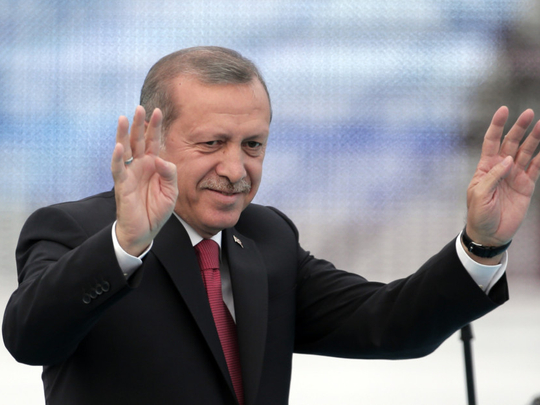
It wasn’t that long ago that Turkish President Recip Tayyep Erdogan was held up by the international community as the poster boy for successful political Islam. On his watch, Turkey blossomed socially and economically and until a few years ago was almost worthy of being called a democracy in every sense of the word, poised to win its long-coveted membership of the European Union.
But that was before Erdogan shed his sheep’s clothing to bare his teeth at his critics in a wholly undemocratic fashion so as to consolidate his personal powers and ensure his political longevity. Unhappy with his largely ceremonial presidential role, he is pushing hard for executive power to be removed from the prime minister and handed to the president. And in the meantime he is extending the boundaries of his mandate by muscling in on cabinet decision-making. Moreover, in spite of the presidency being constitutionally barred from taking sides in party politics, he is out campaigning for the ruling AK Party ahead of the general election to be held on Sunday, which will decide the shape of the Grand National Assembly.
Predictions that the AKP is likely to lose seats with polls indicating that it might even lose its parliamentary majority, Erdogan has gone into panic mode. He’s resorted to playing the faith card during campaign speeches when he is pictured holding up the Quran, a cynical attempt to woo the faithful straight out of the Muslim Brotherhood’s playbook. The president has strong links with the Brotherhood. He has hosted its international conferences, flashed its trademark Raaba hand sign and to this day insists that the ousted Egyptian president Mohammad Mursi remains his president in Egypt, a stance that’s served to alienate his country’s liberals and secularists.
During the last 12 months alone, hundreds of his critics, who’ve dared to challenge his increasing authoritarianism or probed corruption scandals in which he and his circle are alleged to be involved, including editors, journalists and police officers have been jailed. He has purged the judiciary of unfriendly judges and coerced parliament to place it under government control. Human Rights Watch asserts that judges who fail to follow his line are on the road to imprisonment. He has further sacked or menaced prosecutors to the extent they were forced to abandon investigations into government graft.
Social media has been periodically banned. Demonstrations have been greeted with an iron fist. A female district official who greeted Erdogan en route to a public rally with a nationalist hand sign was detained before her office was raided by the president’s bodyguards.
The 2015 World Press Freedom Index compiled by Reporters without Borders ranks Turkey 149th out of 180 countries, below Bangladesh, Malaysia and Mexico and one notch above the Democratic Republic of Congo. Two-thirds of the media overtly favour Erdogan and, indeed, the billionaire owner of the Star Daily and Kanal 24, Elthem Sancak, caused controversy by declaring his love for the president — “a kind of divine love between two men” — and quoting a proverb “may my parents be sacrificed for you”. That didn’t go down very well with religious conservatives.
As if any further proof was needed to show that Erdogan doesn’t take kindly to criticism and has wrapped himself in a Cloud Cuckoo Land bubble, he responded to a New York Times editorial headed “Dark Clouds over Turkey” as “shameless”. “Who are you? Would you dare to write such a thing against the US administration” and “if you did it would immediately do what is necessary”, he said.
Economy is feeling the pinch
Yet Erdogan has succeed in retaining a devoted following. The question is whether or not that following has dwindled not only due to his placing the country’s institutions into a straitjacket, but also because its economy is feeling the pinch.
A survey published by the Metropoll Strategic and Social Research Centre showed that only 34 per cent of voters appreciated the way the economy is being run. Growth has stalled. Unemployment is rising. The Turkish lira has bled its value.
Possibly, the reason why the population hasn’t risen en masse to rail against Erdogan’s de facto rule is because they still remember the good times for which he is broadly credited; in the eyes of many he is still a national hero, faults and all. But the problem is, in the event his party walks away from the elections with a massive victory, he will emerge as an all-powerful president without constraints. And if the past is any indicator of the future, his clampdowns, arrogant behaviour and eccentricities will erode any claims Turkey has to being a democracy.
Worse, there are real fears that the coming election could be rigged as Ihsan Yilmaz, courageously writing in Today’s Zaman has expressed. “Erdogan will do his best to rig the elections and if he is successful, he will not hesitate to isolate Turkey from the world.”
Linda S. Heard is a specialist writer on Middle East affairs. She can be contacted at lheard@gulfnews.com












